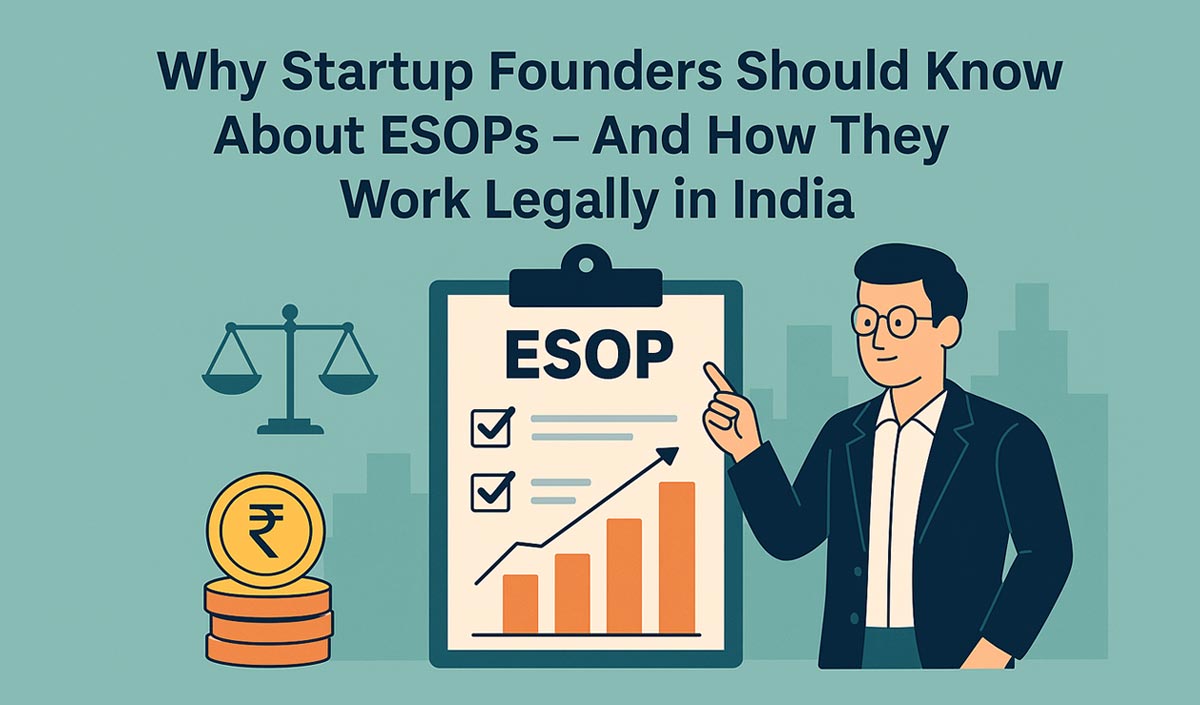Let’s be real for a second. When you’re trying to build a startup in India, the last thing you want to deal with is another legal acronym. ESOP? Sounds boring. Sounds complicated. Sounds like something only unicorns care about, right?
Wrong.
If you’re a founder—even if your team is just you and your co-founder right now—understanding how Employee Stock Option Plans (ESOPs) work is one of the smartest legal moves you can make early on. Why? Because people don’t just work for a salary anymore. They work for ownership. They stay for vision. And ESOPs are how you make that happen legally and fairly.
Okay, So What Even Is an ESOP?
Here’s the short version: An ESOP lets your employees own a piece of your company. Not today, not for free, and not all at once. But over time, if they stick around and help you grow.
Think of it like a promise: “You help me build this now, I’ll make sure you benefit when we succeed.”
It’s not equity you give away blindly. It’s structured, documented, and legally binding. It’s also one of the most common ways Indian startups reward their early team members without burning cash.
Why Bother With ESOPs at All?
Honestly? Because without ESOPs, you’re either overpaying or constantly worried that your best people will leave. Here’s what ESOPs do right:
- They attract talent when you can’t afford fat salaries.
- They build loyalty. When people know they’ll eventually own a part of what they’re building, they’re in it with you.
- They impress investors. Any serious investor will ask, “What’s your ESOP pool?” You’d better have an answer.
- They give your startup structure. Having legal policies from the beginning avoids chaos later.
And the best part? You control how much, when, and to whom the equity goes.
How ESOPs Work Legally in India (Without the Legal Headache)
Here’s what you need to know—no jargon, no fluff:
1. You Set Up an ESOP Pool
Pick a percentage (usually 5%–15% of total equity) and set it aside. This becomes your “ESOP pool.” You’ll need board and shareholder approval for this.
2. You Decide Who Gets What
Once the pool is ready, you issue ESOP grants to your employees. Each grant says: You’ll get X% of shares if you stay for Y years.
3. Vesting Happens
Most Indian startups use a 4-year vesting schedule with a 1-year cliff. That means:
- No shares in the first 12 months.
- After 1 year: 25% vests.
- The rest: Vests monthly or yearly over the next 3 years.
4. Exercise Price
Once vested, employees can “buy” their shares at a pre-decided price (called the exercise price). This is usually super low compared to market value.
5. Exit & Taxes
If you raise funding, go public, or get acquired, employees can sell their shares and make money. But yes, there are taxes. First, as a perquisite tax when they exercise, and then as capital gains when they sell.
What Legal Documents Do You Need?
Here’s a quick checklist (yes, you’ll need a lawyer):
- A proper ESOP Policy (approved by your board and shareholders)
- ESOP Grant Letters for each team member
- Exercise Agreements
- Updated Cap Table
- Valuation Report (Rule 11UA for taxation)
Don’t download random templates from Google. Bad paperwork now = major legal headache later.
ESOP vs Sweat Equity – Not the Same Thing
Some founders think they’re the same. They’re not:
| Factor | ESOP | Sweat Equity |
|---|---|---|
| Who Gets It | Employees (even future ones) | Employees, consultants, promoters |
| When | Future, after vesting | Immediate ownership |
| Price | Paid at exercise | Free or discounted |
| Tax Impact | Perquisite + Capital Gains | Considered income, taxed accordingly |
3 Costly Mistakes Founders Make with ESOPs
- Giving away equity too early, without a proper legal structure
- Not explaining ESOPs clearly to team members
- Ignoring tax implications (for you and your team)
If you plan ESOPs casually, they’ll turn into legal landmines later.
Final Words – Think Long Term
Look, setting up an ESOP isn’t “extra work.” It’s part of growing up as a founder.
It shows your team you care. It shows investors you’re serious. And it gives you peace of mind that you’ve created a fair system where your early believers grow with you.
So don’t wait till your seed round to think about this. Start today—even if your “team” is just you and your co-founder.
— — —
Disclaimer:
This article is published for general legal awareness and informational purposes only, and should not be construed as legal advice or a solicitation to act.
About the Author:
Joginder Poswal is an advocate enrolled with the Bar and practicing law, specializing in cyber law, criminal law, and corporate compliance.
For more information, please refer to the contact details provided on this website.

